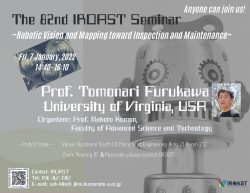- HOME
- SYMPOSIUM & SEMINAR
- 82nd IROAST Seminar "Robot Vision and Mapping toward Inspection and Maintenance"
SYMPOSIUM & SEMINAR
82nd IROAST Seminar "Robot Vision and Mapping toward Inspection and Maintenance" was held on January 7th, 2022

The 82nd IROAST Seminar ~"Robot Vision and Mapping toward Inspection and Maintenance"~ was held on January 7, 2022.
IROAST Visiting Professor, Tomonari Furukawa (University of Virginia, USA) presented a talk to the students "in person at the seminar venue" and "via zoom" as well.
 |
| Professor KUMON Makoto (FAST*), Seminar Coordinator
*FAST: Faculty of Advanced Science and Technology, Kumamoto University |
 |
| IROAST Visiting Professor FURUKAWA Tomonari (University of Virginia, USA) *at the seminar venue
|
 |
| IROAST Visiting Professor FURUKAWA Tomonari (University of Virginia, USA) *via Zoom online
|
82nd IROAST Seminar "Robot Vision and Mapping toward Inspection and Maintenance"
■ Date and Time: Friday, January 7, 2022, 14:40 - 16:10 (4th period)
■ Hybrid Style:
Venue: Kurokami South C8 (Faculty of Engineering Bldg. 2) Room 212
Zoom: Meeting ID and password: Please enquire to the IROAST office using the contact information below.
■ Speaker:
Prof. Tomonari Furukawa, IROAST Visiting Professor
(Department of Mechanical and Aerospace Engineering, University of Virginia, USA)
■ Overview:
Robots have been used for recording or transmitting still images and video streams as technologies advanced. In the current use, humans remain for inspection and maintenance because they can configure three-dimensional (3D) geometry from two-dimensional (2D) information. Such 3D mapping has been studied extensively by the computer vision and robotics communities in the name of 3D reconstruction, but the primary target for mapping was global accuracy. The resulting map with global accuracy is useful for navigating robots, but without sufficient local information, the map cannot be used for inspection and maintenance. As a result, humans should configure the environment and complete the inspection and maintenance tasks.
This talk will review the existing technologies for robotic vision and mapping and first propose a new robotic vision technology, which is developed leveraging photometric stereo (PS). The current robotic vision uses the principles of either stereovision, structured light, or time of flight for depth measurement. Because of the use of no or low-resolution transmitted signals, it is challenging for these technologies to achieve the depth accuracy and the resolution needed for inspection and maintenance. The PS-based robotic vision, giving high depth accuracy and resolution, has the potential to be the vision for inspection and maintenance. The second part of the talk will cover the multi-stage mapping technique for inspection and maintenance. While the current mapping technique creates a globally accurate map, the local accuracy and the resolution of the map is not sufficient. In order to guarantee the local accuracy and the resolution, the variable to control is the distance of the sensor to the nearest object. The proposed technique creates a map with high local accuracy and resolution through two steps. In the first step, the path to cover all the surfaces of the environment is created offline. The unoccupancy distance map (UDM) is defined and used to create the path. The second step controls the robot in an online manner. The local accuracy and the resolution are defined in terms of readings from the sensor and guaranteed by controlling the robot.
The talk will also cover other state-of-the-art technologies developed at the University of Virginia.
■ Organizer:
Prof. Makoto Kumon (Faculty of Advanced Science and Technology)
■ Inquiry:
Sato (ext. 3362)
International Research Organization for Advanced Science and Technology (IROAST)
E-mail: szk-kiko@jimu.kumamoto-u.ac.jp

